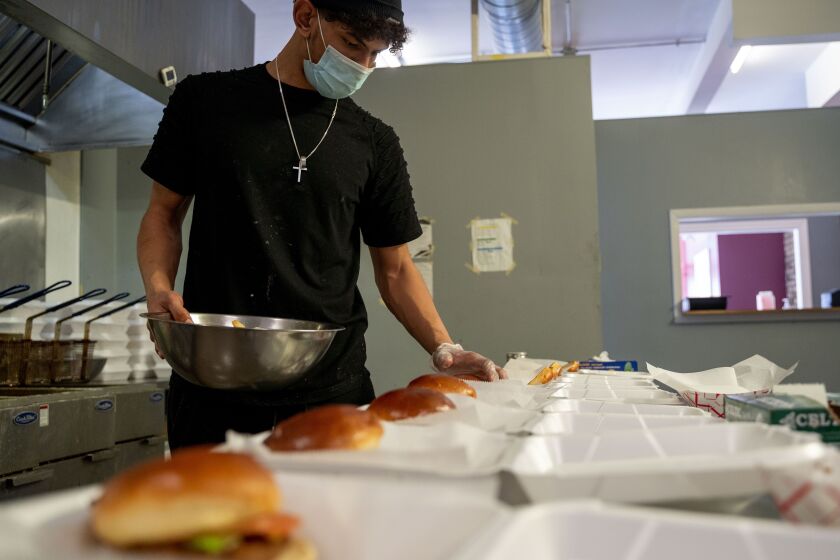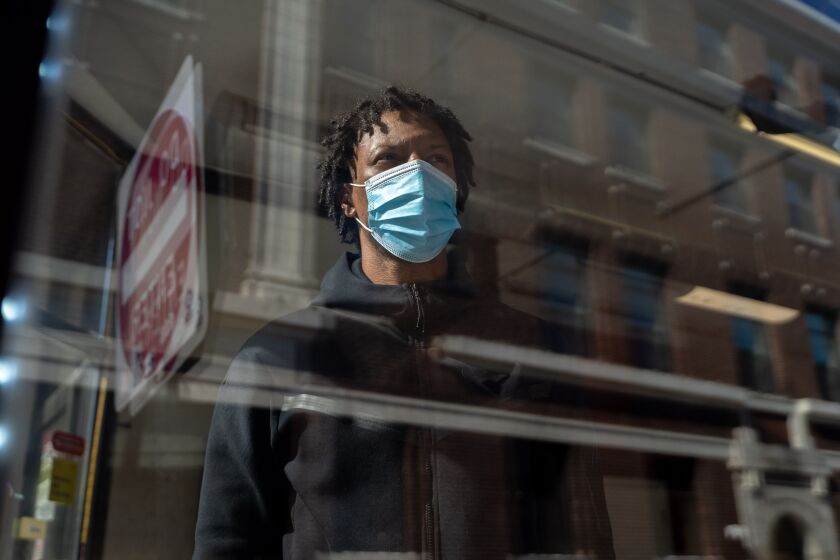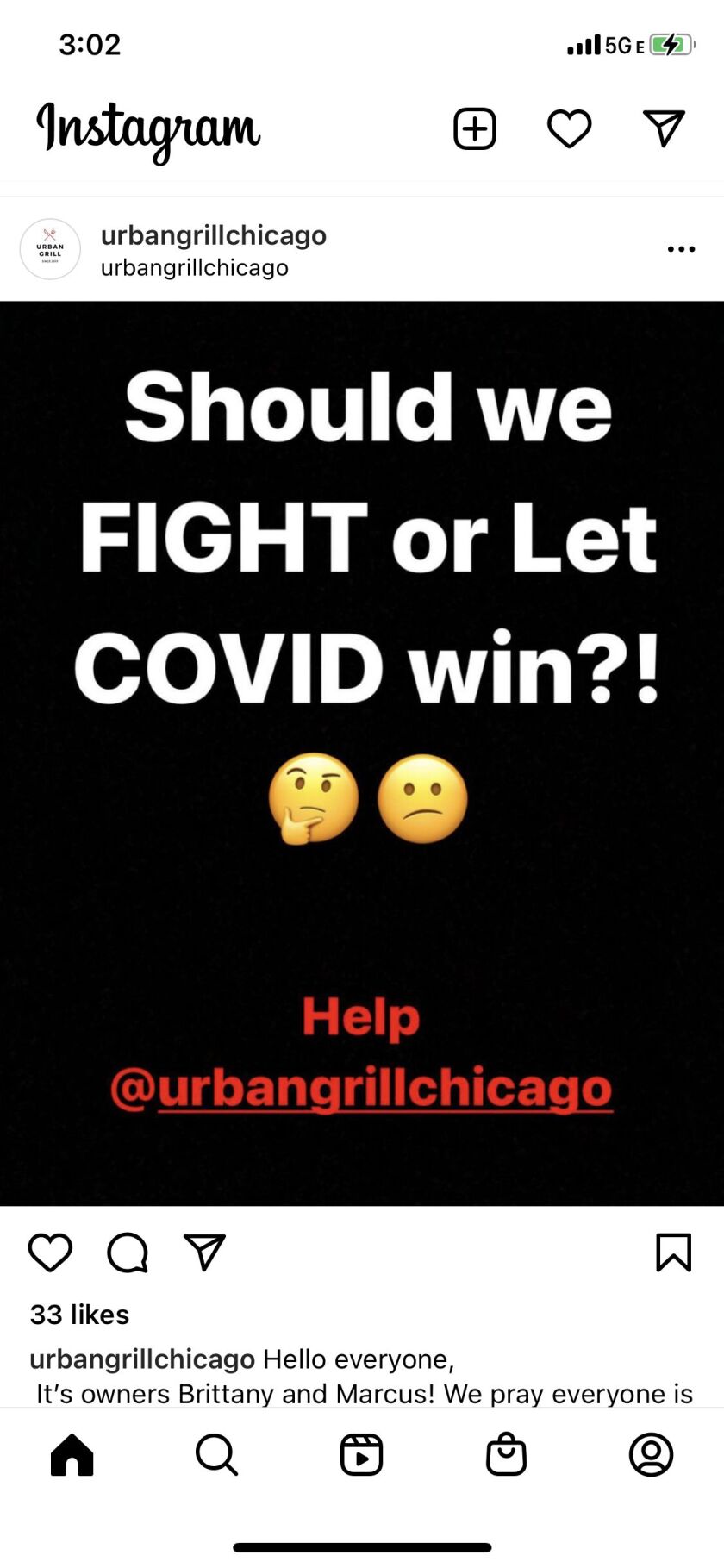The Instagram post caught the eye of an editor: “Should we FIGHT or LET COVID win?!”
It was by Urban Grill Chicago, a tiny, fast-food eatery at 1132 W. Wilson, in Uptown.
“Hello everyone, It’s owners Brittany and Marcus! We pray everyone is staying safe and healthy. Brittany and I have went back and forth on what we should do,” the post began.
“This has been a trying year for a lot of us but we’ve all accomplished some great things in such a short amount of time since the opening of Urban Grill Chicago (1 year and 1 month ago) !! We wanted to be a change, a little ray of sunshine in our little 4 walls in the uptown community and a figure to let black/brown kids or any kids know you can own something and call it yours!”
“Brittany and I have 2 choices. Fight for URBAN GRILL CHICAGO ... or let covid win! Let us know what we should do?!”
A year after COVID-19 shut down the U.S. economy, battering small businesses, the lament by the owners of this tiny fried chicken, burgers and shrimp joint on Chicago’s North Side very poignantly gives voice to a large segment of Small Business America.
The story of its millennial owners is one of perseverance — growing up amid the challenges of the inner city, overcoming obstacles in their love story, now struggling to hold on to their first business, a lifelong dream that COVID-19 threatens to convert to nightmare.
“I’ve always wanted to own a restaurant,” said Marcus Ward, 33, who has worked at the Near South Side Marriott Marquis Hotel for three years, and four other hotels over 11 years.
“A friend who owns several restaurants called me in fall 2019 and said he found a great space, on Wilson near busy Broadway Avenue, across from Truman College. It was perfect!
“I told Brittany, ‘We’re opening a restaurant.’ She’s like, ‘What are you talking about?’ It wasn’t something either one of us had experience in. I explained it’s always been my dream, and because Brittany’s always got my back, she was like, ‘OK. I know you’re always going to make a way out of no way. Let’s do it,’ ” Ward recounted.
What followed was a crash course in restaurant operations, and emptying their savings of some $90,000 to build out the space, hire 20 employees and launch, on Jan. 6, 2020.
The timing could not have been worse.
It’s a great location, so business took off. Soon, though, so did COVID-19, which has killed 519,039 Americans to date.
Local governments forced businesses to close. Urban Grill, like other small businesses nationwide, withered.
“My wife always said, you can get food from anywhere. We’re really selling ourselves, Marcus and Brittany. That’s how we went in,” said Ward.
“We immediately became active in the community. The energy in our restaurant was vibrant. The neighborhood embraced us. Then came COVID. Schools closed. No one was coming outside. We went from vibrant to dead, immediately.”
Within a few months, the pandemic had devastated America’s small businesses. The numbers operating nationwide fell by 2.2 million between February and May — a 15 percent loss in a sector that accounts for 64% of all new jobs created in the U.S.
The pandemic exacerbated already existing racial inequities in access to bank credit and financial cushions that bolster sustainability. Between February and April, 41 percent of the nation’s 1 million Black-owned businesses had shuttered for good.
For Ward, COVID-19’s impact wasn’t limited to his business. Like many entrepreneurs, he and his wife planned to hold on to other employment while growing their venture.
Brittany Ward, who was to run their restaurant, had worked several years for Target Corp., and when their daughter was 2, gave up work for entrepreneurial ventures she could do at home.
Marcus Ward was to keep working. Trouble was, he was employed in the nation’s hard-hit leisure and hospitality industry.
“You work during the high season, spring to fall, then off during low season, winter. Financially, you plan for being off November thru March. You don’t plan for COVID to cancel all bookings and eliminate your job,” said the father of three.
“I’d put everything we had into this restaurant, thinking I’ll replenish our savings when work starts. Now, as provider for my family, I’m out of a job and my business is dead.”
A National Bureau of Economic Research paper found by the time states re-opened in May, 26% of Black-owned businesses had closed, compared with 11% of white counterparts; 25% of immigrant-owned businesses had closed; 21 % of Asian-owned, and 9% of Hispanic-owned.

Employee Ariel Burns, 21, prepares a catering order Wednesday at Urban Grill Chicago, 1132 W. Wilson Ave. He is among the few remaining staff, after owners Marcus and Brittany Ward were forced to lay off three quarters of their staff, after COVID-19 shuttered the economy, just two months after the tiny fast-food eatery opened in Uptown.
Mengshin Lin/Sun-Times
It gets worse. The Wards didn’t qualify for significant loan help from the federal Paycheck Protection Program (PPP) intended to help businesses stay afloat.
“People were saying, ‘Marcus, there’s money out there.’ But when we researched, we didn’t qualify. A lot of those grants said you had to be in business two or three years,” Ward said.
“They didn’t account for businesses that just opened, and had no financials from previous years to show. That whole program was problematic. They were calling small businesses those with 1,000 employees. Mom and Pop businesses like us, we got overlooked.”
Studies found inequities in that program, which doled out some $525 billion in loans. Data analyzed by the Associated Press found six loans approved for every 1,000 applicants from the 20% of Zip codes with the greatest proportion of white residents — almost twice the rate approved for applicants from the 20% of Zip codes with the least white residents.
After months of struggling, the Wards were ready to close the doors by April.
It was about that time that food insecurity rose as a clear byproduct of the pandemic.
Ward decided despite their struggles, their restaurant should help their community.
Their Instagram offer of free food for any hungry child went viral.

Millennial couple Marcus and Brittany Ward poured their life savings into their first entrepreneurial venture, Urban Grill Chicago, at 1132 W. Wilson Ave. in Uptown, just before COVID-19 hit, shuttering the economy. Their story is representative of a large segment of Small Business America.
Provided
Organizations reached out. Donations poured in. Over the next two months, Urban Grill partnered with nonprofits citywide to distribute 70,000 free meals — 50,000 to children.
“We had like a few hundreds dollars left in the bank. So we bought food and said, ‘Any kid that wants to eat, come to Urban Grill. We’re not going to charge you.’ We never expected that response,” said Ward. “We didn’t do it for notoriety. We were operating on faith.”
When the buzz died though, so did the unexpected bump in business.
A national poll released Jan. 27 by Small Business Majority, found small businesses continuing to face a challenging economic landscape amid reduced customer demand; 18 percent of Black-owned businesses expect to close for good in the next three months.
Urban Grill’s owners, no strangers to adversity, had held on through the fall and winter.
Both grew up on the South Side. Brittany Ward, the only child of a single mother, struggled to pay for her college education, eventually completing her master’s, with Ward’s help.

After a year of struggling to keep afloat his restaurant, Urban Grill Chicago, at 1132 W. Wilson, Marcus Ward’s recent post on social media, “Should we FIGHT or LET COVID win?!” poignantly gave voice to a large segment of Small Business America. He has taken it down, after an outpouring of positive feedback. “It served its purpose,” he said.
Mengshin Lin/Sun-Times
Ward grew up with parents who battled substance abuse — a battle won only after a difficult and impoverished childhood for him and his brother. Ward himself had two children before he and his wife married five years ago. This couple knows perseverance.
But now, bills piling up, Ward wondered if COVID-19 might have to win this one.
“With covid and little to work with we’ve made a difference!” he said in the recent Instagram post. “We’ve made friends of strangers, became figures to young children and young adults in the neighborhood and we’ve helped thousands of people from the kindness of our hearts! And for that we are proud!!!!!”
By the time we reached Ward, the post had disappeared.
“I took it down because it had served its purpose,” he said. “We got an outpouring, people saying, ‘The community needs you.’ ‘Kids need the role model you provide.’ It was the validation I needed, knowing that whatever happens, people understand. I didn’t want to feel like I was begging. I just wanted wanted people to know where I was coming from.”








